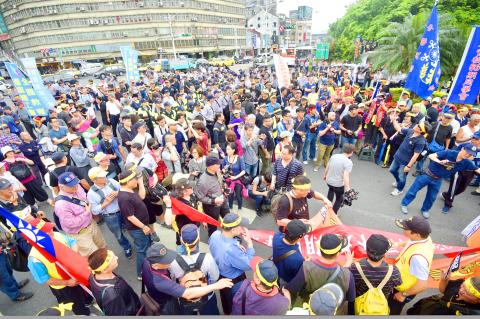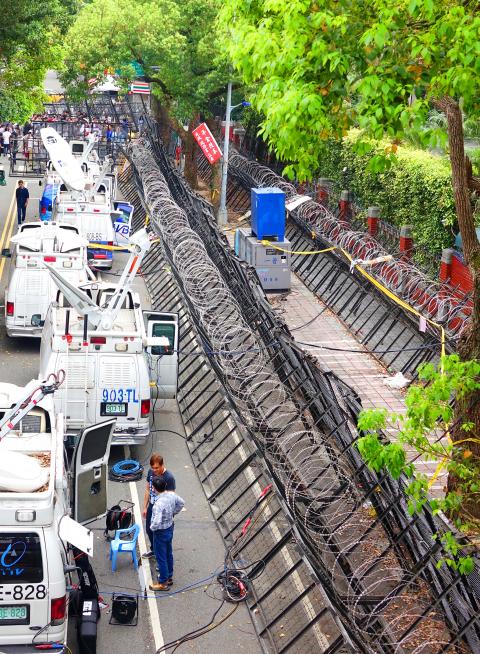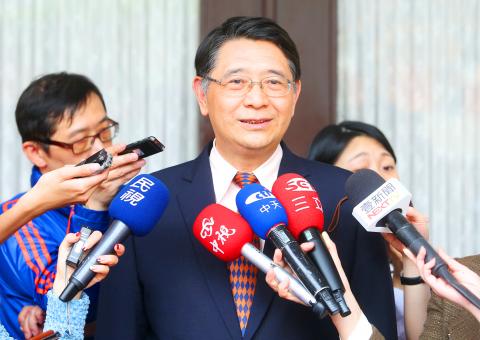Barricades placed outside the Legislative Yuan are to remain amid security concerns over ongoing pension reform protests and intelligence reports that agitators, including former special forces personnel, might use smoke bombs and attack officers, a legislative official said yesterday.
Citing intelligence provided to the legislature on Monday afternoon by National Police Administration (NPA) Director-General Chen Kuo-en (陳國恩), Legislative Yuan Secretary-General Lin Chih-chia (林志嘉) said that some protesters might take aggressive action aimed at causing bodily harm.
Many of the protesters are suspected to be retired police officers and military personnel, Lin quoted Chen as saying.

Photo: Huang Yao-cheng, Taipei Times
The agency believes there is a higher risk of police being attacked in the ongoing protest compared with previous pension reform protests — including the one on March 29 in which 22 officers were injured during clashes, Lin said.
Lin said the agency is taking the current protest seriously because the demonstrators are not ordinary citizens or young people, such as those who participated in the 2014 Sunflower movement.
The security measures are aimed at guaranteeing that the legislature can function normally, Lin said, adding that the agency is asking lawmakers and the media to bear with the situation.

Photo: Liu Hsin-de, Taipei Times
Lawmakers are set to review pension reform proposals for public servants today and tomorrow.
The planned legislative review attracted a new wave of demonstrations yesterday by civic groups composed of public servants, teachers and military personnel that was organized by the Pension Reform Oversight Alliance, which staged what it called a “Besiege the Legislative Yuan” protest.
Lin said the legislature decided to keep the barricades after a meeting on Monday between Legislative Speaker Su Jia-chyuan (蘇嘉全) and Chinese Nationalist Party (KMT) caucus convener Sufin Siluko (廖國棟) and caucus secretary-general Alicia Wang (王育敏).

Photo: CNA
Lin said Sufin Siluko and Wang told Su that they were “troubled” by the wire barricades placed in the general area of the legislature.
Su assured the lawmakers that no barricades are to be placed within the legislature’s premises, but security outside the site is under the jurisdiction of the Taipei City Government and the police agency, Lin said.
Su said that if the KMT could convince protesters to pledge that they would not resort to violence, charge the legislature or clash with police, he would ask the NPA to reduce security levels in the area, Lin said.
As Su did not receive any message from the KMT caucus, the legislature could only conclude that the pledge was not forthcoming, Lin said.
Separately yesterday, Taipei Police Department Commissioner Chiu Feng-kuang (邱豐光) told city councilors during a question-and-answer session that about 2,000 police officers are to be deployed at the protest — 1,500 from the Taipei Police Department and 500 from the NPA.
Obstacles deployed include 1,248 sets of wire knife-rests, 230 rolls of concertina wire, 670 large-sized fences, 680 pedestrian barriers, 14 wire-laying vehicles and four vehicles with mounted floodlights, Chiu said, adding that no other special vehicles or water cannon trucks are to be used.
Additional reporting by CNA

Taiwan is projected to lose a working-age population of about 6.67 million people in two waves of retirement in the coming years, as the nation confronts accelerating demographic decline and a shortage of younger workers to take their place, the Ministry of the Interior said. Taiwan experienced its largest baby boom between 1958 and 1966, when the population grew by 3.78 million, followed by a second surge of 2.89 million between 1976 and 1982, ministry data showed. In 2023, the first of those baby boom generations — those born in the late 1950s and early 1960s — began to enter retirement, triggering

ECONOMIC BOOST: Should the more than 23 million people eligible for the NT$10,000 handouts spend them the same way as in 2023, GDP could rise 0.5 percent, an official said Universal cash handouts of NT$10,000 (US$330) are to be disbursed late next month at the earliest — including to permanent residents and foreign residents married to Taiwanese — pending legislative approval, the Ministry of Finance said yesterday. The Executive Yuan yesterday approved the Special Act for Strengthening Economic, Social and National Security Resilience in Response to International Circumstances (因應國際情勢強化經濟社會及民生國安韌性特別條例). The NT$550 billion special budget includes NT$236 billion for the cash handouts, plus an additional NT$20 billion set aside as reserve funds, expected to be used to support industries. Handouts might begin one month after the bill is promulgated and would be completed within

The National Development Council (NDC) yesterday unveiled details of new regulations that ease restrictions on foreigners working or living in Taiwan, as part of a bid to attract skilled workers from abroad. The regulations, which could go into effect in the first quarter of next year, stem from amendments to the Act for the Recruitment and Employment of Foreign Professionals (外國專業人才延攬及僱用法) passed by lawmakers on Aug. 29. Students categorized as “overseas compatriots” would be allowed to stay and work in Taiwan in the two years after their graduation without obtaining additional permits, doing away with the evaluation process that is currently required,

IMPORTANT BACKER: China seeks to expel US influence from the Indo-Pacific region and supplant Washington as the global leader, MAC Minister Chiu Chui-cheng said China is preparing for war to seize Taiwan, Mainland Affairs Council (MAC) Minister Chiu Chui-cheng (邱垂正) said in Washington on Friday, warning that Taiwan’s fall would trigger a regional “domino effect” endangering US security. In a speech titled “Maintaining the Peaceful and Stable Status Quo Across the Taiwan Strait is in Line with the Shared Interests of Taiwan and the United States,” Chiu said Taiwan’s strategic importance is “closely tied” to US interests. Geopolitically, Taiwan sits in a “core position” in the first island chain — an arc stretching from Japan, through Taiwan and the Philippines, to Borneo, which is shared by